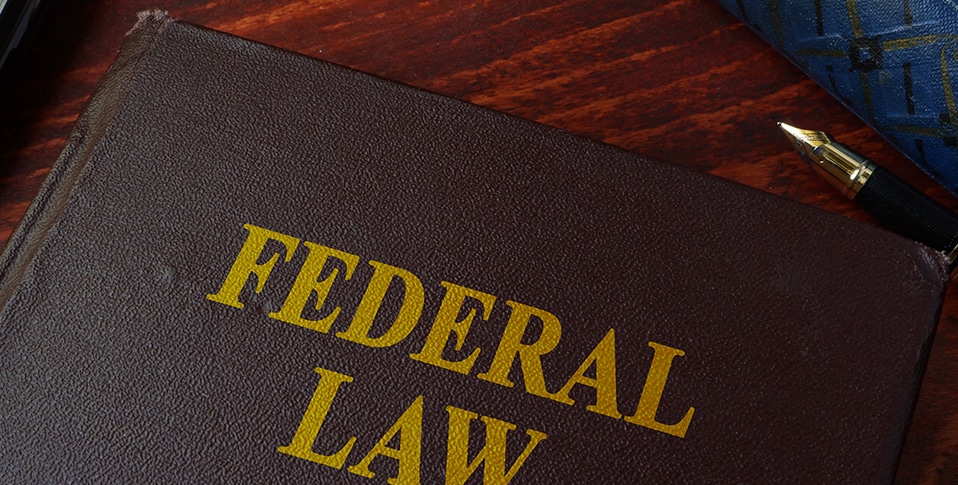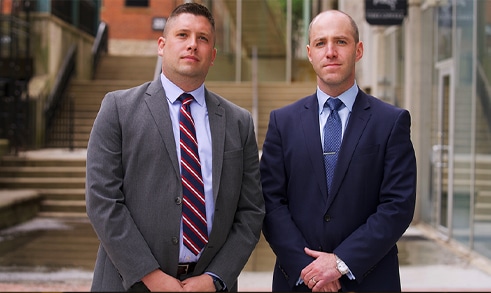
Columbus Federal Criminal Defense Lawyers
Experienced federal and state attorneys for all serious crimes
There are major differences between criminal cases in federal courts as compared to Ohio courts. Federal courts generally have jurisdiction over crimes that involve activity on federal lands or involve Ohio and another state. The rules for trying a federal criminal case are much different than trying a state case. Most importantly, the consequences are different. Convictions in federal court usually result in longer sentences and larger fines.
At Soroka & Associates, LLC, our Columbus lawyers are respected defense attorneys helping people fight criminal charges in federal courts. We’ll help you understand the charges and the criminal process. We’ll represent you from the date of arrest through the bail hearing, preliminary hearings, motion hearings, jury trial, sentencing, and appeal. Our trial lawyers, Roger R. Soroka and Joshua Bedtelyon, are experienced and successful federal criminal defense lawyers.
How can we help?
- How do federal crimes differ from state crimes?
- What types of cases do your Columbus attorneys handle in federal court?
- When does Columbus drug trafficking become a federal offense?
- What are examples of white collar crimes?
- What are RICO charges?
- What are federal OVI/DUI charges?
- What is double jeopardy?
- What is federal post-conviction relief?
- Where are the federal courts in Ohio?
- Do you have a federal criminal defense lawyer near me?

How do federal crimes differ from state crimes?
There are many differences between federal and state crimes that our experienced Columbus federal criminal defense lawyers can explain. These differences include:
- The rules of procedure for filing charges, hearing cases, and selecting juries are different.
- The rules of presenting evidence are different.
- Different appeals courts hear appellate issues.
- The sentences are normally harsher in federal courts. The sentencing rules are different. Federal courts follow federal sentencing guidelines, while state courts follow state sentencing guidelines.
- Federal cases are heard in federal courts while state cases are heard in state courts.
- In federal cases, defendants are sentenced to federal prisons and not to county jails.
In criminal cases in federal courts, federal agencies such as the DEA or FBI are usually involved in investigating any criminal activity and in testifying in court.
Federal crimes are set forth in the United States Code Title 18. Ohio crimes are set forth in the Ohio Code, Title 29.
What types of cases do your Columbus attorneys handle in federal court?
You are likely to be charged with a federal offense if the offense involves activity in multiple states, occurs on federal land, involves a federal official or agency, or is prohibited by federal law but not by state law.
Federal crimes include drug crimes, white-collar crimes, RICO offenses, driving under the influence of alcohol or drugs, sex crimes such as sex trafficking, violent crimes, tax crimes, and cybersecurity crimes.
When does Columbus drug trafficking become a federal offense?
Drug trafficking generally involves the manufacture, sale, transport, or distribution of controlled substances. Drug trafficking becomes a federal offense if the drug distribution chain from manufacture to possession crosses state lines or international boundaries – by land, sea, or air.
Generally, if the US DEA is involved in the investigation of the offense, federal charges will be filed. If local law enforcement is involved, Ohio drug trafficking charges will be filed.
What are examples of white collar crimes?
White-collar crimes are generally financial non-violent crimes. They often involve professionals or people in positions of trust or authority. Some of the many types of white-collar crimes we handle include:
- Embezzlement
- Forgery
- Fraud, including investment fraud, mortgage fraud, securities fraud, and health care fraud
- Insider trading
- Identity theft and cybercrimes
- Money laundering
- Counterfeiting
White-collar criminal defendants can include individuals and corporations.
What are RICO charges?
Racketeer Influenced and Corrupt Organizations Act (RICO) charges can be filed in federal court against those accused of participating in organized criminal activity. Illegal criminal activity includes many different types of offenses, include drug trafficking, embezzlement, bribery, illegal gambling, and many types of illegal business practices.
A conviction for a RICO offense can result in lengthy prison sentences, huge fines, the seizure of assets (including homes, business, tangible property, and intangible property) by the government, civil actions, and other severe consequences.
What are federal OVI/DUI charges?
Drivers who operate a vehicle in Columbus while under the influence of alcohol can be charged with an OVI. You may be charged in federal court if you were arrested while driving on federal lands such as military bases, national parks, an airport, or post offices.
What is double jeopardy?
A common issue regarding whether charges should be filed in federal court or state court is if a defendant can be prosecuted in one court if he/she is acquitted in another court. The Fifth Amendment to the US Constitution provides that defendants cannot be prosecuted for the same crime twice. Generally, this “double jeopardy” protection only applies to subsequent charges in the same court.
If you are charged in federal court and acquitted, you cannot be charged in federal court again, and vice-versa.
However, federal and state/Ohio courts are considered separate jurisdictions. This generally means that if you are tried in federal court and acquitted, you still could be tried in Ohio court for the same offense – and vice-versa.
What is federal post-conviction relief?
Federal post-conviction relief is a federal remedy that grants defendants the right to file a Section 2225 motion. Defendants can only file this motion once and only on certain grounds. The 2225 motion generally does not include claims that can be filed through the standard appellate process. Common 2225 grounds include:
- Violations of the US Constitution
- Ineffective assistance of counsel
- Violations of a defendant’s right to due process
- Prosecutorial misconduct
- Violations of federal laws
- A lack of jurisdiction of the trial or sentencing court
Where are the federal courts in Ohio?
Ohio has two federal courts:
- The Northern District of Ohio has locations in Akron, Cleveland, Toledo, and Youngstown.
- The Southern District of Ohio has locations in Cincinnati, Columbus, and Dayton.
The Columbus office is located at:
Joseph P. Kinneary U.S. Courthouse
Room 121
85 Marconi Boulevard
Columbus, Ohio 43215
Do you have a federal criminal defense lawyer near me?
The Columbus office of Soroka & Associates is located at 503 South Front Street, Suite 205 – close to I-71 and Rt. 23. We meet clients at detention centers if necessary.
Get help now. Contact our seasoned Columbus federal criminal defense lawyers today.
You are presumed innocent. The government often cannot prove its case beyond a reasonable doubt. At Soroka & Associates, our Columbus criminal defense lawyers are skilled at developing strong strategies aimed at helping you secure and keep your freedom. We’re seasoned trial lawyers and we’ll guide you through each phase of the criminal process. Call us at 614-918-4078 or use our contact form to schedule a free consultation.
